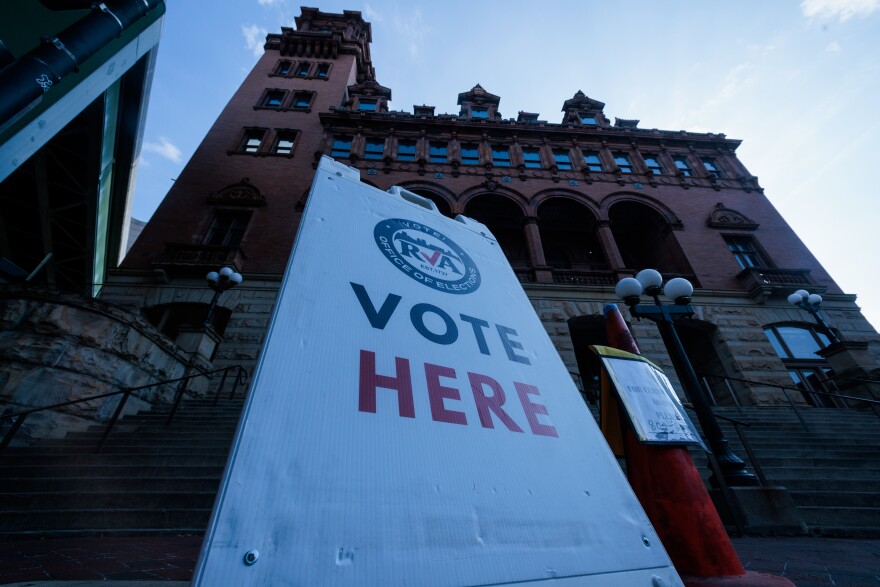This story was reported by WAMU.
Following competitive and fractious campaigns, Democrats and Republicans chose a nominee in a key open congressional seat in the Northern Virginia suburbs, with unofficial results posting Tuesday night.
In Virginia’s 10th Congressional District, centered in Loudoun County, voters ultimately selected state Sen. Suhas Subramanyam, who represents eastern Loudoun County. The race was one of the messiest Democratic primaries this year, with a dozen candidates vying for the nomination and an enormous amount of money pouring into the race from outside groups.
Subramanyam received a relatively late-breaking endorsement from the incumbent, Democratic Rep. Jennifer Wexton. He also narrowly beat out Del. Dan Helmer, who led the pack in fundraising but faced allegations of sexual misconduct in the final week of the race.
“This district is my home. I got married here. My kids were born here. The issues our community faces are personal to our family,” Subramanyam said in a statement on Tuesday night. “I will continue to be a champion for families here and make sure everyone feels like they have a voice.”
Subramanyam will face Republican Mike Clancy, a tech executive and a regular commentator for conservative news giant Newsmax, in the general election. Clancy previously ran for his party’s nomination for the seat in 2022, and his primary campaign centered on the theme of “restoring America” by securing the southern border and adhering to conservative economic principles.
Elsewhere in Northern Virginia, longtime incumbent Rep. Gerry Connolly easily survived a primary challenge in the 11th Congressional District.
Statewide, Republicans nominated Hung Cao to challenge Democratic incumbent Sen. Tim Kaine in November. Cao, a former Navy officer who unsuccessfully challenged Wexton for Congress in 2022, received Trump’s endorsement and far outraised the other candidates, pulling in $2.5 million. He also faced criticism on the campaign trail that funds from his state super PAC, intended to help Republican legislative candidates last November, actually went to pay people associated with his Senate primary bid. Cao denies the allegations.
Now, all eyes in Virginia will turn to the November election, which will offer another data point about just how blue the purplish commonwealth has swung in recent years. Democrats are fresh off of victory last November, when they narrowly captured control of both chambers of the Legislature in Richmond, a feat Helmer orchestrated as the party’s caucus chair. But just two years prior, Republican Gov. Glenn Youngkin proved his party can still win statewide, given the right conditions and message, and polls suggest he remains consistently popular with Virginians.

Neither President Joe Biden nor former President Donald Trump are especially popular among Virginians, according to a Roanoke College poll from late May. Biden won the commonwealth in 2020 by about 10 points, and most political watchers believe he is likely to carry it again — though the same May poll ruffled political feathers by showing Biden and Trump tied among likely voters. They also generally believe Kaine’s re-election bid for U.S. Senate — now against Cao — is likely to be successful for the two-term incumbent.
Further down the ticket, Republican congressional candidate Clancy will have to confront the question of how closely to align with Trump or a more moderate vision of the GOP that may be more palatable to the suburban and exurban voters he needs to court. Youngkin, one of the party’s biggest Virginia success stories, managed to walk that line — positioning himself as a basketball-playing, vest-wearing, guy-next-door businessman who could also deliver on conservative culture-wars issues like “parent’s rights.”
Youngkin and Virginia Republicans have also wrestled politically with the party’s position mostly opposing abortion rights, which does not align with the majority of Virginians’ views on the subject. In last year’s state legislative races, Youngkin and Republicans test-drove a potential 15-week ban as a more moderate consensus to far more restrictive measures in place in the rest of the South, but ultimately fell short to Democrats, who ran on promises to maintain existing state laws on the procedure. Clancy’s campaign website does not specify a policy position, but calls himself “a steadfast advocate for life” and a supporter of crisis pregnancy centers.
In the 10th District, Subramanyam is favored in the general election against Clancy, but his win also comes after a brutal primary that sharply divided Democrats, who’ll need to fall in line come November. And it also comes amid deep frustrations from some Democrats over the Biden administration’s handling of the war in Gaza, concerns that featured heavily in debates and discussions about the primary.
Subramanyam has stopped short of supporting an immediate ceasefire in Gaza, but said he is “never a fan of forever wars,” and would like to see the U.S. broker a peaceful two-state solution.
Regardless of party infighting, Subramanyam’s candidacy is historic. If elected in November, he’d be the first Indian-American elected to Congress from Virginia, a significant factor in a district that includes 65,000 South Asian residents, according to the Indian American Impact Fund, a PAC that supported his candidacy in the primary.


